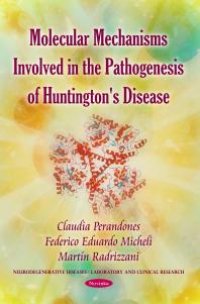
Ebook: Molecular Mechanisms Involved in the Pathogenesis of Huntington's Disease
- Tags: Huntington''s chorea -- Molecular aspects., Huntington''s chorea -- Pathogenesis.
- Series: Neurodegenerative Diseases - Laboratory and Clinical Research
- Year: 2010
- Publisher: Nova Science Publishers
- City: Hauppauge, United States
- Edition: 1
- Language: English
- pdf
Huntington's disease (HD) is an autosomal-dominant, progressive neurodegenerative disorder with a distinct phenotype, including chorea, incoordination, cognitive decline, and behavioral difficulties. The underlying genetic defect responsible for the disease is the expansion of a CAG repeat in the gene coding for the HD protein, huntingtin (htt). This CAG repeat is an unstable triplet repeat DNA sequence, and its length is inversely correlated with the age at onset of the disease. Expanded CAG repeats have been found in 8 other inherited neurodegenerative diseases. Despite its widespread distribution, mutant htt causes selective neurodegeneration, which occurs preferentially and most prominently in the striatum and deeper layers of the cortex. This book focuses on HD, outlining the effects of mutant htt in the nucleus and cytoplasm as well as the role of cell-cell interactions in the HD pathology.
Download the book Molecular Mechanisms Involved in the Pathogenesis of Huntington's Disease for free or read online
Continue reading on any device:

Last viewed books
Related books
{related-news}
Comments (0)